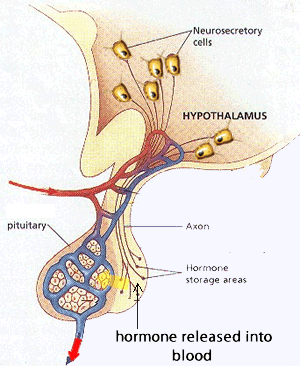Question #bda4a
1 Answer
During SUMMER SEASON
-
As summer days are hot and warm, as an adaptation for homeostatic
maintenance#rarr# to lose excess body heat , our body loses
large amount of water in the form of sweat. -
Hence there is decrease in the Body fluid and blood pressure..
-
As a result a hormone called Vasopressin also called
Antidiuretic hormone{ADH}#rarr# Prevent Diuresis{ loss of excess water through urine}is released from the posterior
pituitary{Neurohypophysis}. - This hormone is synthesized by Paraventricular nucleus of
hypothalamus{PVH} and is stored in the neurohypophysis(in vesicles).

- Dehydration is detected by osmoreceptors in hypothalamus.
- The secretion of this hormone is stimulated by a decrease in the
arterial blood volume#rarr# increased osmolarity of blood
plasma{hyperosmolarity} - Main site of action of ADH :KIDNEYS
-
Increase water reabsorption in renal tubules
-
constricts blood vessels with rise in blood pressure thus counters the blood pressure drop during dehydration.
-
Due to the release of ADH into the blood it does its functions as
mentioned thus increasing the body fluid by decreasing the amount of
water lost in the urine. -
As most of the water in the urine is reabsorbed the urine is very
concentrated in summer season.
During WINTER SEASON:
-
The reverse occurs during winter season. As no dehydration occurs
and no change in body fluid volume, all the excess water is lost in
the urine as no ADH is released. -
The urine will be very hypotonic and dilute during winter season.
In the other seasons the amount of water in urine is moderate as temperature is moderate.

